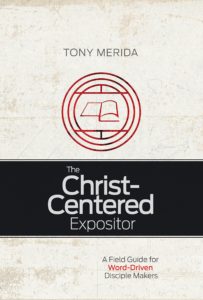
Someone recently told me a new pastor had started at their church and that he was so boring and intellectual that he should be teaching in a seminary. He was using a new style of preaching…”expositional,” it was called. This congregant had never heard of “expositional” preaching until this pastor had come, and the impression he gave was not positive!
When I preach, it is expositional. I’ve not had a chance yet to preach through an entire book, but whenever I preach, I feel most comfortable selecting one passage and working through it–explaining, illustrating, and applying. If I speak on a topic, I find one passage that best addresses that topic, and I preach that passage expositionally. I find that this is the best way to allow Scripture to penetrate the hearts of the listeners.
I don’t think pastors should always preach through books of the Bible. Cultural and congregational issues beg to be addressed by special series, and sometimes an old-fashioned topical sermon just needs to be unleashed. But over the long haul, I believe our churches are best served by a predominantly expositional style of preaching.
 Long ago I began a list of benefits of expositional preaching. As I worked through this week’s Book of the Week, The Christ-Centered Expositor by Tony Merida, I came across a few more reasons to add to my list (pp. 17-19). All together, I now have fourteen benefits of expositional preaching.
Long ago I began a list of benefits of expositional preaching. As I worked through this week’s Book of the Week, The Christ-Centered Expositor by Tony Merida, I came across a few more reasons to add to my list (pp. 17-19). All together, I now have fourteen benefits of expositional preaching.
- It magnifies the word of God rather than the opinion of the preacher.
- It produces a culture devoted to the Bible. People begin bringing their Bibles to church ready to follow along in God’s word as it is preached.
- It provides authority for the preacher, who is getting his message directly from Scripture.
- It safeguards against doctrinal error. It becomes more difficult to perpetuate poor hobby-horse theology when one must only preach what is in the passage before him.
- It eliminates the hurried and frantic search each Sunday for a topic and supporting passages.
- It protects against “rut preaching.” For some preachers, it doesn’t matter where they start–they will always end up on the same points of doctrine or application.
- In the long-run, it produces mature believers who are well grounded in the Scriptures.
- It meets human needs that the preacher may never have thought to address.
- It safeguards the pastor’s congregational relationships. Addressing sensitive or contentious issues is difficult if the pastor chooses when to do so (“is he saying that because of me?”). Addressing the same issue when it naturally falls in the preaching schedule as one works through a book avoids this issue and allows the Spirit to decide when to address that issue.
- Study resources are easier to use week-to-week. If you preach through Mark, you can use the same 3 commentaries for months. If you choose a new topic each week with new verses, you’ll be lucky to have one or two commentaries to consult on one or two of your supporting texts. Or worse, you’ll use books written on your topic and your supporting authority will lie with a human author rather than God’s word.
- It forces the pastor to address touchy subjects like predestination, homosexuality, or gender roles–at least in the long-run.
- It is good for both believers and unbelievers and keeps the preacher from focusing too much on evangelism or doctrinal teaching.
- It edifies the pastor as he systematically studies a passage of God’s word each week, in context, from beginning to end of each book.
- It teaches the congregation how to study Scripture on their own.
What other benefits can you think of? Please comment below and maybe we can get to 20! Also check out Merida’s The Christ-Centered Expositor. It’s a resource most preachers would enjoy having in their arsenal.

3 comments